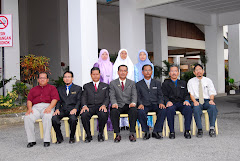When You Disagree With The Principal
By: TS Nor Riha
TEACHERS and principals don't always agree. Here are some tips on handling disagreements with the principal.
Whether your principal is a Napleonic taskmaster or a disciple of Dale Carnegie, sooner or later he or she ia bound to make a decision with which you disagree. That decision could related to curriculum,working policies, or perhaps even your professional evaluation. Like fingernails on a chalkboard, that decision will upset you to point where you must vent. The question becomes How do I approach my administrator when I feel I have a reasonable beef ?
During my career , I've seen teachers respond to administrative edicts in every possible way.
- I've seen some teachers go to battle. Like pit bull on a short leash, they let their boss and the entire school know of their disgust.
- I've seen others take the "rear guard" aproach. They never directly confront the principal's decision : instead, they expel their frustrations by sniping from sidelines.
- Still others turn inward. Convinced their ideas aren't valued, they withdraw into their classrooms and rarely surface or participate.
- I have also seen many colleagues take a rational approach that's based upon common sense and mutual respect between professionals.
FIVE COMMONSENSE TIPS
When it comes to handling frustration, I admit I'm no paragon of virtue. I have been known to pound my fist from time to time . Over the years, though , I have learned that the way I choose to frame my diagreement it my personal choice. It's a choice that can affect me as well as my teaching team, my students, the entire school , and my career.
Over tose same years, I've gained greater appreciation for the use of tact. Every once in a while, though, I need a refresher course. When I'm at loggerheads with an administrator, I try to remind myself of a few reasonable principles.
Be straightforward. Backstabbing is never a wortwhile or appropriate tactic. The most constructive means of dealing with any disagreement is to do it directly. When an administrator's determination becomes a point of friction, anything less than a candid discussion will only intensify the heat.
Private, not public . For sure , if an administrator actively solicits input to a building -wide decission during a staff meeting, that forum is a legitimate venue for a civil rebuttal to his planned course of action. However, any sensitive issue personel related or otherwise should be handled in a private meeting. A staff meeting is no place for a blindsided assault on an administrator.
Be assertive rather than aloof or pushy. By all means, when a live issue is on table, don't be 'shy' . If something is bothering you, pretending it will go away or that it doesn't really matter won't accomplish anything. Thoughts unspoken are likely to fester and lead to additional frustrations. On the other hand, a combative approach can be just a counterproductive. The body language of aggresion arms crossed, a scowl , a raised voice will force the principal to be defensive instead of being open to an alternative perspective. The best approach, almost always, is to state the case simply, clearly, and without excess emotion.
Cite bone fide (genuine) research or school-wide data. Professional journal articles can be an excellent source of support for your point of view; they can lend credence to a specific teaching strategy you want to employ if your administrator is unfamiliar with that approach. Data especially data collected at the school level can help you make a strong case too. The more your position is grounded in observable realities and concrete information, the less likely it will be viewed as vintage emotional complain.
Remember who is the captain. If push comes to shove, remember that your principal is the team captain. For sure, any school leader worth their salt requires and values justifiable input. The best administrators seek consensus wherever possible. But, in those cases where consesus don't or can't, exist , the prinsipal must make his best judgement call. Don't begrude him . Don't fight a losing battle . Move on.










